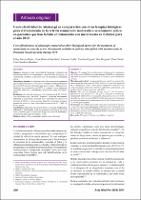Costo efectividad de Abatacept en comparación con otras terapias biológicas para el tratamiento de la artritis reumatoide moderada a severamente activa en pacientes que han fallado al tratamiento con metotrexato en EsSalud para el año 2010
Related Resource(s)
http://www.scielo.org.pe/scielo.php?pid=S1728-59172011000400005&script=sci_arttext&tlng=enDate
2011Author(s)
Becerra Rojas, Felipe
Benites Chacaltana, César
Aiello, Eleonora
Zingoni, Carolina
Bergman, Gert
Drost, Pieter
Sanabria Montañez, César
Metadata
Show full item recordAlternate title
Cost-effectiveness of abatacept compared to other biological agents for the treatment of
moderately to severely active rheumatoid arthritis in patients who failed with methotrexate in
Peruvian Social Security during 2010
Abstract
Objetivo: Estimar la costo efectividad de Abatacept combinado con
Metotrexato (MTX) en comparación a otras DARMEs biológicas, en
combinación con MTX, en pacientes con AR moderada a severamente
activa.
Materiales y métodos: Se adaptó un modelo de secuencias de tratamiento
para la representación de la invalidez en términos del índice HAQ en un
horizonte de 5 años de enfermedad para una cohorte de 1 000 pacientes.
Abatacept en combinación con MTX se comparó contra etanercept,
rituximab, infliximab, adalimumab y tocilizumab, todas asociadas a
MTX.
Resultados: El costo de tratamiento con Abatacept es de S/. 169 263
y su efectividad es de 1.96 AVAC. Respecto a etanercept, adalimumab,
infliximab y tocilizumab, abatacept se ha mostrado más efectivo en
términos de AVACs y menos costoso. Respecto a rituximab, abatacept
presenta un índice de costo efectividad incremental de S/ 75 493 por
AVAC ganado.
Conclusiones: Abatacept es dominante frente a Etanercept, Adalimumab,
Infliximab y Tocilizumab, desde la perspectiva del Seguro Social de
Salud (EsSalud) para el tratamiento de pacientes con AR moderada a
severamente activa que han fallado a MTX Objective: To estimate the cost-effectiveness of Abatacept in combination
with Methotrexate (MTX) versus other biologic DMARDs in combination
with MTX in patients with moderately to severely active rheumatoid
arthritis.
Materials and methods: A sequential therapy model was adapted for
representing disability using the HAQ Index in a 5-year horizon period
for a 1000-patient cohort. Abatacept in combination with MTX was
compared against etanercept, rituximab, infliximab, adalimumab, and
tocilizumab, all of them combined with MTX.
Results: The cost of abatacept therapy was S/. 169 263 and its
effectiveness was found to be 1.96 QALY. Compared to etanercept,
adalimumab, infliximab and tocilizumab, abatacept has shown to be the
most effective agent in terms of QALYs and the least expensive. Compared
to rituximab, abatacept has an incremental cost effectiveness ratio of S/.
75 493 per QALY gained.
Conclusions: According to this model, abatacept was found to be superior
compared to etanercept, adalimumab, infliximab, and tocilizumab, from
the Peruvian Social Security (EsSalud) perspective for the treatment of
moderately to severely active Rheumatoid Arthritis in patients who failed
using a MTX-based therapy.
Collections
- Artículos científicos [891]






